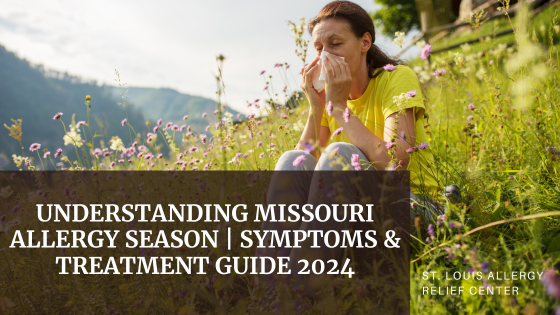Understanding Missouri Allergy Season | Symptoms & Treatment Guide 2024

Missouri’s picturesque landscapes and diverse climates provide residents with a wealth of natural beauty, but they also harbor a less welcome presence: allergens. From the vibrant cities of St. Louis and Kansas City to the tranquil countryside, understanding the allergens prevalent in the Show-Me State is essential for maintaining health and wellness. Let’s delve into the common allergens of Missouri, their seasonal patterns, and effective management strategies to ensure a comfortable lifestyle for all residents.
Seasonal Allergies: A Year-Round Concern
Missouri’s climate, characterized by cold winters and humid summers, contributes to a year-round allergy season. Each season brings its own set of allergens, triggering symptoms in sensitive individuals.
Spring Allergens: Spring heralds the arrival of pollen from trees, with oak, cedar, hickory, walnut, and ash trees being significant contributors. Pollen levels typically rise from late February to May, peaking in March and extending into mid-July. These pollen grains, carried by the wind for miles, can induce allergic reactions, causing symptoms such as sneezing, nasal congestion, and itchy eyes.
Summer Allergens: Grass pollen dominates Missouri’s summer allergy season, with ryegrass, Bermuda grass, and timothy grass being primary culprits. Grass allergies usually manifest from May to July, triggering symptoms similar to those of spring allergies.
Fall Allergens: As summer transitions to fall, ragweed becomes a prevalent allergen in Missouri, along with other weeds like pigweed, thistle, and marsh elder. Fall allergies can begin as early as August and persist until the first frost, causing respiratory symptoms and exacerbating existing allergies.
Winter Allergens: While winter typically provides a reprieve from outdoor allergens like pollen, indoor allergens such as dust mites, mold, and pet dander remain prevalent. Cold weather may exacerbate respiratory conditions, necessitating continued vigilance in managing indoor allergies.
Regional Variances in Allergens
Missouri’s diverse regions exhibit variations in allergen prevalence, influencing the timing and severity of allergic reactions.
Kirksville: Hickory, oak, walnut, ash, maple, and mulberry trees contribute to spring allergies, while grass pollen from ryegrass and bent grasses dominates the summer. Fall allergies in Kirksville stem from weeds like ragweed and amaranth.
Columbia/Jefferson City/Kansas City/St. Joseph: Spring allergies in these areas may include hickory, oak, cedar, ash, and willow trees. Summer allergies predominantly result from grasses like Bermuda and timothy, while fall allergies are triggered by ragweed and mustard.
Springfield/Branson/Joplin: Residents of these regions contend with spring allergies from hickory, oak, willow, pecan, walnut, and mulberry trees. Grass pollen allergies peak in summer, followed by weed allergies in fall, including marsh elder and ragweed.
St. Louis/Cape Girardeau: Spring allergies in St. Louis and Cape Girardeau arise from hickory, oak, walnut, willow, cedar, and ash trees. Summer grass allergies may include ryegrass and Bermuda, while fall allergies stem from ragweed and sagebrush.
Managing Allergies: Strategies for Relief
Mitigating exposure to allergens and implementing appropriate management strategies are key to alleviating allergic symptoms and improving quality of life.
Avoidance: Minimize outdoor activities during peak pollen times, usually from 5-10 a.m. Utilize rainy days, when pollen levels are lower, for outdoor tasks. Wear protective gear like masks and gloves while gardening to reduce allergen exposure.
Medications: Over-the-counter antihistamines, nasal corticosteroids, and allergy eye drops can provide temporary symptomatic relief. Unfortunately, the same is true for allergen immunotherapy such as allergy shots or sublingual medications. Medications can have side effects or become ineffective over time.
Consultation with Specialists: Seek guidance from a holistic allergist. One who is trained in personalizing a natural allergy management plan. It begins with allergy testing which identifies specific allergen families and guides the treatment decisions, ensuring tailored care for individual needs.
Introducing Advanced Allergy Therapeutics (AAT)
At St. Louis Allergy Relief, we offer a revolutionary approach to allergy treatment through Advanced Allergy Therapeutics (AAT). Developed from nearly two decades of clinical research, AAT is a non-invasive and highly effective treatment that targets the root cause of allergic reactions. Unlike traditional methods relying on medications or supplements, AAT harnesses the body’s innate healing mechanisms to provide relief from allergies and sensitivities.
AAT utilizes a precision-based acupressure technique to stimulate specific points on the body, known as the Sympathetic Chain, corresponding to the organ systems involved in allergic reactions. This gentle stimulation helps to reduce stress on the affected organ systems, allowing for a healthier response to allergens. During treatment, a subtle representation of the offending substance is introduced to the skin through a digital signal, further aiding in desensitization.
The Benefits of AAT
One of the key advantages of AAT is its non-invasive nature. There are no needles, pin-prick testing, or herbal remedies involved, making it suitable for individuals of all ages, including infants and the elderly. The treatment is safe, painless, and gentle, providing soothing results without the need for medications or supplements. By addressing the underlying cause of allergic reactions, AAT offers long-lasting relief, allowing individuals to enjoy life free from the constraints of allergies.
Mastering Missouri’s Allergen Landscape
Navigating allergens in Missouri demands vigilance, knowledge, and proactive measures to mitigate symptoms and enjoy all that the state has to offer. By understanding prevalent allergens, recognizing seasonal patterns, and implementing effective management strategies, residents can embrace a healthier, more comfortable lifestyle, free from the burdens of allergic reactions. Remember, with proper awareness and appropriate interventions, allergies need not hinder one’s enjoyment of Missouri’s natural wonders and cultural treasures.